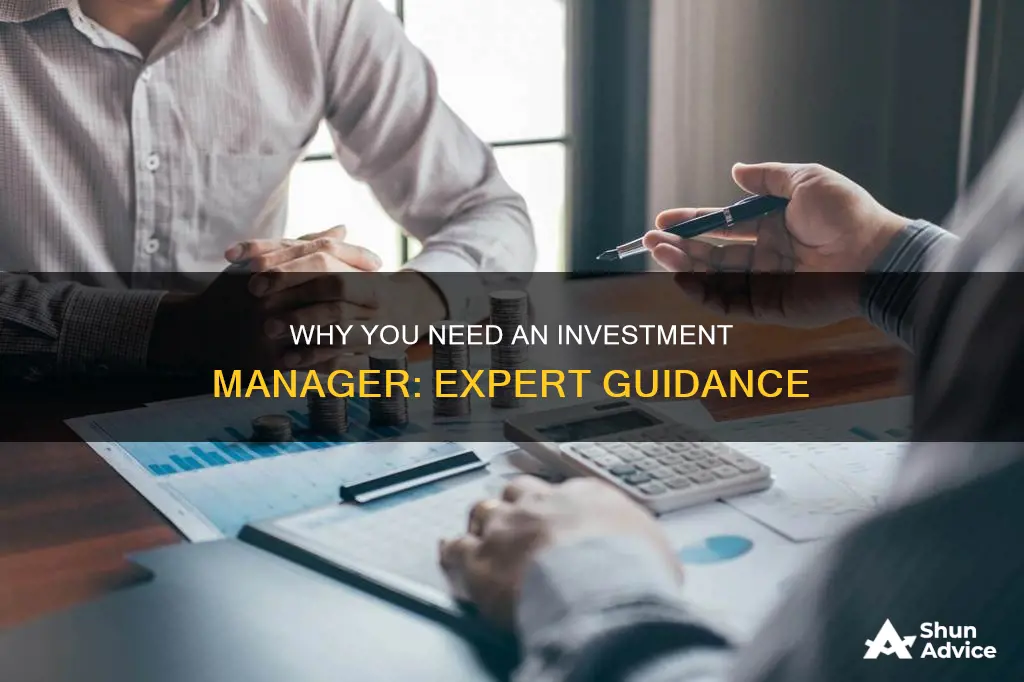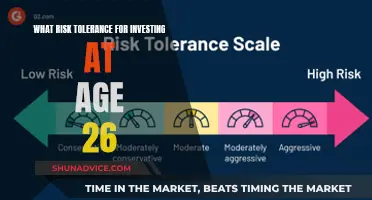
Investment managers are individuals or organisations that advise clients through financial planning, investing, and portfolio management. They can be one-person offices or large firms with global offices. Their fee is often based on a percentage of the client's assets under management. While some people enjoy managing their own money, others may find it overwhelming and prefer to leave it to a professional. So, when is the right time to hire an investment manager?
If you feel lost planning for your financial future and need a roadmap, or if you simply don't want to deal with money, hiring an investment manager could be a good idea. Additionally, if you have a complex financial situation, such as managing a small business, or limited time to dedicate to understanding and managing your investments, an investment manager could provide valuable assistance. They can act as a coach, helping you keep your emotions in check and make rational decisions.
However, it's important to note that ongoing money management can be costly, with annual fees ranging from 1% to 1.5% of your total assets under management. Many wealth advisors also require a minimum amount of money to invest, typically a quarter to half a million dollars. Therefore, it's essential to carefully consider your needs, goals, and financial situation before deciding whether to hire an investment manager.
| Characteristics | Values |
|---|---|
| When to hire an investment manager | When you feel "lost" in planning for your financial future and need a roadmap; when you don't want to deal with your finances; when you want an impartial third-party opinion on your money; when your finances are complex; when you don't have the time to manage your investments; when you are prone to making irrational decisions. |
| Investment manager qualifications | Undergraduate degrees in business, statistics, finance, mathematics, or accounting; MBA; professional certifications such as Certified Financial Planner (CFP) or Chartered Financial Analyst (CFA). |
| Investment manager skills | Excellent communication skills; ability to obtain and sustain a client's trust; analytical skills to interpret market information; ability to understand financial data; ability to work effectively under pressure. |
| Investment manager responsibilities | Financial planning; investing; portfolio management; buying and selling securities and assets; transaction settlement; performance measurement; devising strategies; executing trades. |
| Investment manager fee structure | Based on a percentage of client assets under management (AUM); management fees; performance fees; custody fees; commissions. |
What You'll Learn

Financial planning
- Identifying financial needs: The first step is to assess your financial goals and priorities. This includes short- and long-term objectives such as saving for retirement, buying a house, or investing in the stock market. It's important to have a clear understanding of your financial situation, including income, expenses, assets, and liabilities.
- Choosing the right advisor: Financial advisors offer different services, so it's crucial to select one that matches your needs. Some advisors provide holistic financial planning, while others specialize in specific areas like debt management, investing, or tax strategy. Consider their credentials, such as Certified Financial Planner (CFP) or Registered Investment Advisor (RIA), and always verify their background and experience.
- Understanding fee structures: Financial advisors have different fee structures. Some charge a percentage of the assets under their management, while others use a flat fee, hourly rate, or retainer. It's important to understand these fees before engaging their services.
- Evaluating your financial situation: Before deciding whether to hire a financial advisor, take an extensive look at your finances. Calculate your net worth by subtracting liabilities (debts) from assets (investments, property, etc.). Assess your income, expenses, and financial goals to determine if you need help with budgeting or investing.
- Seeking advice at key life stages: Financial advisors can be particularly valuable during significant life changes, such as getting married, having children, or receiving an inheritance. They can guide you through these transitions and help you make informed financial decisions.
- Considering investment management: Investment managers are a type of financial advisor who focuses on investing and portfolio management. They help individuals or institutions devise investment strategies, execute trades, and monitor market performance. When choosing an investment manager, consider their qualifications, fee structure, and performance track record.
- DIY financial planning: If your financial situation is relatively simple and you enjoy managing your finances, you may opt for a DIY approach. However, it's important to regularly review your financial situation, as life changes can impact your finances.
Investment Strategies: Cash Reserves in Your Portfolio
You may want to see also

Emotional support
Deciding whether or not to hire an investment manager can be an emotional decision. It can be stressful to manage your own finances, and the prospect of handing over control to a professional can be daunting.
If you're feeling "lost" when it comes to planning your financial future, it might be time to consider hiring an investment manager. Financial advisors can provide a roadmap and help you feel more confident about your future. This can be especially helpful if you're facing a major financial event, such as receiving an inheritance or planning for retirement.
On the other hand, you may enjoy managing your own money and learning about finance. In this case, the emotional support of an investment manager might not be necessary. However, it's important to recognise that managing your own investments can be time-consuming and stressful, and it's easy to make expensive mistakes.
Some people may benefit from the hand-holding that an investment manager can provide. If you know what to do rationally with your investments but struggle to stick to your plan when the market fluctuates, an external voice of reason could help you adhere to your financial strategy.
It's also important to consider your level of sophistication and interest in finances. If the thought of managing your own investments makes you want to scratch your eyeballs out, as one source colourfully puts it, then you might benefit from the emotional support of a financial professional.
Ultimately, the decision to hire an investment manager depends on your goals, needs, knowledge, and current financial situation. If you're feeling overwhelmed or stressed about your finances, it might be worth considering the emotional support that an investment manager can provide.
Loans: Saving or Investing? Understanding the Financial Impact
You may want to see also

Investment returns
When considering investment returns, it is essential to understand the different types of investment methodologies employed by investment managers. One common approach is index investing, which involves holding a diversified portfolio of stocks or bonds that track a particular market index, such as US large company stocks or US small company stocks. This strategy aims to capture the average rate of return offered by the market and has been favoured by many investors due to its reliability in generating returns over time.
Another type of investment methodology aims to outperform the average market returns. This approach involves selecting stocks and bonds that are expected to perform better than average or timing the market by buying and selling securities at opportune moments. These strategies rely on the skill and expertise of the investment manager and often incur significant costs. While some managers may achieve above-market returns, research indicates that most managers using these methodologies do not outperform the market on a cost-adjusted basis.
It is worth noting that investment returns can be volatile regardless of the methodology used. When evaluating investment managers, it is crucial to consider long-term performance data and assess the repeatability and consistency of their investment process.
Additionally, the fees charged by investment managers can impact overall investment returns. Investment managers typically charge a percentage of the client's assets under management (AUM), with average fees ranging from 1% to 2%. It is important for investors to carefully evaluate the fee structures of different investment managers and consider the potential impact on their overall returns.
In conclusion, investment returns depend on various factors, including market performance, investment strategies, and fees. When seeking to maximise investment returns, it is essential to conduct thorough research, consider different investment methodologies, and make informed decisions based on an investor's financial goals, risk tolerance, and time horizon.
Understanding Churning: When Your Broker Overtrades Your Portfolio
You may want to see also

Cost of an investment manager
The cost of an investment manager depends on several factors, including the fee structure, the type of advisor, and the level of service provided. Here are the most common fee structures:
- Annual retainer: Financial planners typically charge an annual fee, which can range from $2,000 to $7,500 per year. This usually includes comprehensive financial planning services and investment management.
- Hourly rate: Investment managers may charge by the hour, with rates typically ranging from $200 to $400 per hour. This option is suitable for those who only need occasional advice or guidance.
- Percentage of invested assets: This is known as an AUM (assets under management) fee and is usually between 0.25% to 1% per year of the total account balance. For example, a 1% fee on a $100,000 investment would amount to $1,000 per year. This fee often decreases as the amount of assets under management increases.
- Flat fee: Some investment managers charge a one-time fee for a financial plan, which can range from $1,000 to $3,000. This option is suitable for those who want a financial plan but prefer to manage their investments themselves.
- Commissions: Some investment managers earn commissions on the investments they recommend, which can range from 3% to 8% of the investment amount. This structure can create conflicts of interest, as advisors may be incentivized to recommend products that generate higher commissions rather than those that are in the best interests of the client.
It is important to understand the different fee structures and choose an advisor who offers the level of service you need. Additionally, it is crucial to ask about any additional fees or expenses that may be incurred, as these can add up significantly over time.
The All-Weather Portfolio: A Guide to Investing for Stability
You may want to see also

DIY vs. hiring an expert
The decision to hire an investment manager or manage your own investments depends on several factors, including your financial goals, knowledge, and complexity of your financial situation. Here are some advantages and disadvantages of both options to help you make an informed decision.
Hiring an Expert
Pros:
- Expert management of your portfolio: Investment managers are professionals who can provide expert advice and management of your investments, taking into account your financial goals and needs.
- Peace of mind: You can have peace of mind knowing that a qualified professional is monitoring the market, your portfolio, and making necessary adjustments.
- Comprehensive financial planning: Investment managers can provide ongoing financial planning and answer any questions you may have.
- Emotional support and hand-holding: If you are prone to making impulsive financial decisions or feel overwhelmed by the complexity of investing, an investment manager can provide emotional support and guidance to help you stay on course.
Cons:
- Fees: Hiring an investment manager typically comes with fees, which are often based on a percentage of your assets under management. These fees can be significant, ranging from 1% to 1.5% of your total assets.
- Risk of substandard advice: While most investment managers are skilled and ethical, there is a risk of encountering a substandard advisor who may not provide the best advice or service.
- Potential for high fees and underperformance: Some investment managers may charge high fees without delivering superior returns. It is important to assess the manager's process and monitor their performance to ensure you are getting value for your money.
DIY (Do-It-Yourself)
Pros:
- Cost savings: By managing your own investments, you can save on investment management fees.
- Enjoyment and control: If you enjoy managing your money and making your own financial decisions, DIY investing can be a rewarding experience.
- Accessibility: With the availability of financial information, online brokers, and low-fee market index funds, it has become more accessible for individuals to manage their own investments.
Cons:
- Potential for underperformance: Your portfolio may not perform as well as that of a professional investment manager.
- Inappropriate allocation: Without expert guidance, you may not allocate your investments appropriately, leaving your portfolio vulnerable to market fluctuations.
- Expensive mistakes: There is a risk of making costly mistakes, such as paying high hidden fees, missing out on tax savings, or making poor investment choices.
- Time commitment: DIY investing requires a significant time investment to research, monitor, and manage your portfolio effectively.
Ultimately, the decision to hire an investment manager or manage your own investments depends on your specific circumstances and preferences. It is important to carefully consider the advantages and disadvantages of each option before making a decision.
Cash in Investment Portfolios: Asset or Liability?
You may want to see also







